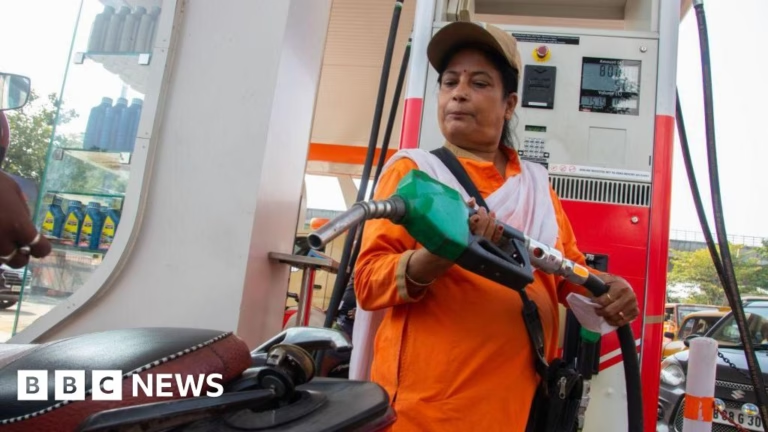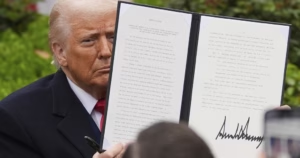<
div>
Annabelle Liang
Business reporter
Business reporter


Getty Images
China has said it will take “resolute countermeasures” in response to US tariffs
As US President Donald Trump laid out tariffs on virtually every one of America’s trading partners on Wednesday, he had strong words for Beijing.
“I have great respect for President Xi [Jinping] of China, great respect for China, but they were taking tremendous advantage of us,” Trump said during his roughly hour-long address Wednesday.
Holding up a chart listing countries and territories that he said had put up trade barriers to US goods, Trump said: “If you look at that… China, first row, 67%. That’s tariffs charged to the USA, including currency manipulation and trade barriers.”
“We are going to be charging [them] a discounted reciprocal tariff of 34%,” he added. “In other words, they charge us, we charge them, we charge them less. So how can anybody be upset?”
But China’s Commerce Ministry immediately called the move “a typical act of unilateral bullying” and pledged to take “resolute countermeasures to safeguard its rights and interests”.
And state news agency Xinhua accused Trump of “turning trade into an over simplistic tit-for-tat game”.
Experts believe Beijing has good reason to be upset.
For one, the latest announcement is an add on to existing tariffs of 20% on Chinese goods.
Secondly, by imposing heavy tariffs on other South East Asian countries including Cambodia, Vietnam and Laos, it has ‘slammed the door shut’ on how China rejigged its supply chains to get around the tariffs imposed on Beijing during Trump’s first term.
There were five Asian nations in the 10 countries and territories hit with the highest tariffs.
“I have great respect for President Xi [Jinping] of China, great respect for China, but they were taking tremendous advantage of us,” Trump said during his roughly hour-long address Wednesday.
Holding up a chart listing countries and territories that he said had put up trade barriers to US goods, Trump said: “If you look at that… China, first row, 67%. That’s tariffs charged to the USA, including currency manipulation and trade barriers.”
“We are going to be charging [them] a discounted reciprocal tariff of 34%,” he added. “In other words, they charge us, we charge them, we charge them less. So how can anybody be upset?”
But China’s Commerce Ministry immediately called the move “a typical act of unilateral bullying” and pledged to take “resolute countermeasures to safeguard its rights and interests”.
And state news agency Xinhua accused Trump of “turning trade into an over simplistic tit-for-tat game”.
Experts believe Beijing has good reason to be upset.
For one, the latest announcement is an add on to existing tariffs of 20% on Chinese goods.
Secondly, by imposing heavy tariffs on other South East Asian countries including Cambodia, Vietnam and Laos, it has ‘slammed the door shut’ on how China rejigged its supply chains to get around the tariffs imposed on Beijing during Trump’s first term.
There were five Asian nations in the 10 countries and territories hit with the highest tariffs.
The taxes are adding up for China
Trump has imposed new tariffs on Chinese imports since returning to the White House in January, ratcheting up levies to 20%.
In less than a week, these tariffs will jump to 54%, apart from on products like cars, steel and aluminium, which will be subjected to lower tariffs.
Beijing has also been on the receiving end of other Trump trade salvos.
Earlier on Wednesday, the President signed an executive order to end a provision for low-value parcels from China.
This had allowed Chinese e-commerce giants like Shein and Temu to ship packages with a retail value of under $800 (£617) to the US, without taxes and inspections.
Close to 1.4 billion shipments entered the US under the provision in the last financial year, according to customs data.
The removal of the exemption could force some Chinese firms to pass the extra cost on to customers, making their goods less competitive in the US.
In less than a week, these tariffs will jump to 54%, apart from on products like cars, steel and aluminium, which will be subjected to lower tariffs.
Beijing has also been on the receiving end of other Trump trade salvos.
Earlier on Wednesday, the President signed an executive order to end a provision for low-value parcels from China.
This had allowed Chinese e-commerce giants like Shein and Temu to ship packages with a retail value of under $800 (£617) to the US, without taxes and inspections.
Close to 1.4 billion shipments entered the US under the provision in the last financial year, according to customs data.
The removal of the exemption could force some Chinese firms to pass the extra cost on to customers, making their goods less competitive in the US.

/live(df3a7860-1029-11f0-8c55-9bef81eba07b).webp)
Getty Images
US President Donald Trump has announced tariffs on 180 countries and territories
<
div>
<
div>
Source: https://www.bbc.com/news/articles/cgm8vxevyplo
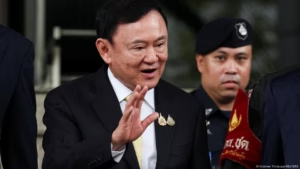

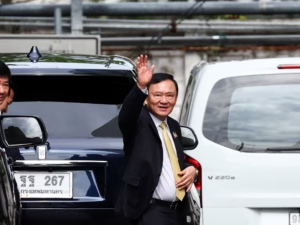

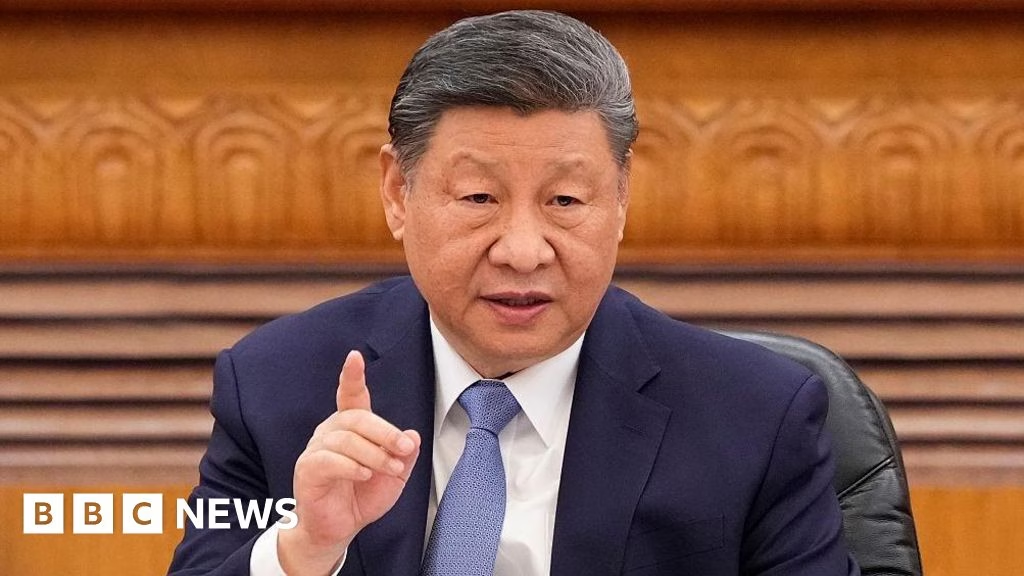
(240w).webp)


